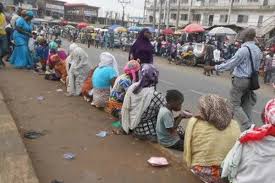BY KASE GREATNESS
Residents of Asaba, the capital of Delta State, have expressed concerns over significant increase in the number of beggars, particularly from the Fulani community and other Northern extraction.
Many of the beggars, predominantly Fulani women, and children, have been observed in major areas of the city, including the busy Koka axis under bridge, market squares, and Ibusa junction axis.
The beggars often send their children ahead to stop passersby and ask for alms, while they position in other locations.
Local sources indicate that most of these beggars are not residents of Asaba but have migrated to the city from neighboring states in search of better living conditions.
Economic hardship, lack of formal education, and limited access to basic resources are believed to be the primary factors driving the increase in street begging among the Fulani community.
Some residents of Asaba have expressed concerns that the growing presence of beggars could contribute to public safety issues and impact the city’s image, which has seen growth in recent years due to infrastructure developments and an influx of businesses.
On the other hand, there is a growing call for empathy, with advocacy groups urging the government and citizens alike to work together in addressing the underlying causes of street begging.
“We understand that the Fulani people face unique challenges, especially in urban centers. While it’s unfortunate to see so many of them resorting to begging, there is an urgent need for more support and welfare programs targeted at these marginalized groups,” said a passerby who asked to remain anonymous.
It will be recalled that, recently, the Commissioner for Women Affairs and Social Development, Princess Pat Ajudua led a team of the ministry’s officials to dislodge some street beggars and homeless children in Asaba.


